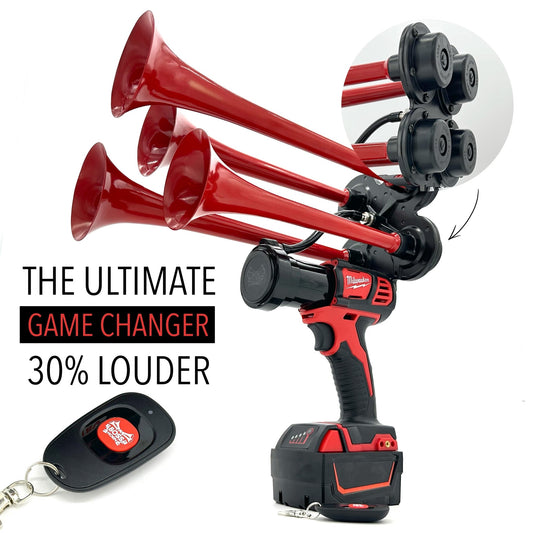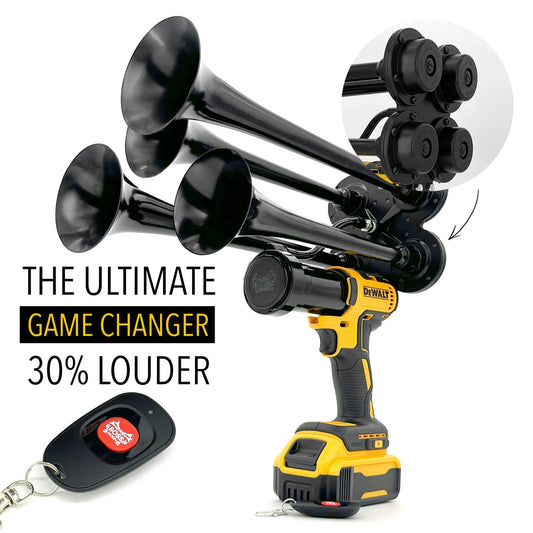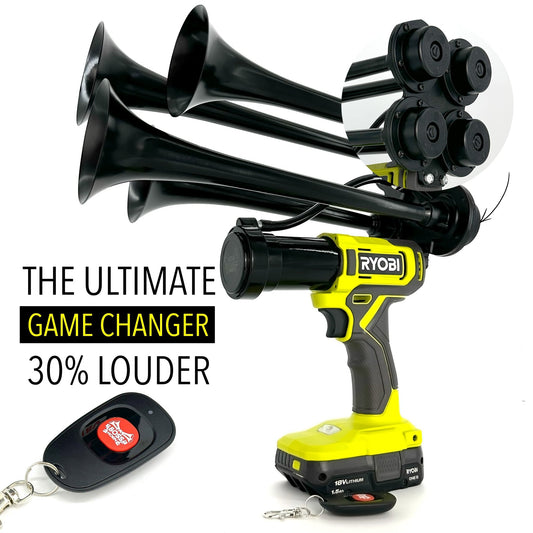Did you know that train horns are designed to be loud enough to be heard from a significant distance, alerting those in the vicinity to the presence of an approaching train? This distinctive sound has been a crucial safety feature on trains for decades, helping to prevent accidents at railroad crossings.
In recent years, some truck owners have taken to installing train horns on their vehicles, seeking to emulate the loud and attention-grabbing sound. While this may seem like a fun and unique modification, it has raised concerns about the legality and safety implications of using train horns on trucks. The use of train horns on trucks can be disruptive to others on the road, potentially causing confusion and even accidents.
One potential solution to this issue is for truck owners to opt for legal alternatives to train horns, such as air horns that are specifically designed for use on vehicles. These horns can still provide a loud and effective warning signal without the potential legal repercussions of using a train horn. In fact, studies have shown that properly functioning air horns can be just as effective in alerting others to the presence of a truck on the road.
As laws and regulations surrounding vehicle modifications continue to evolve, it is important for truck owners to stay informed about what is legally permissible when it comes to adding accessories like train horns to their vehicles. By prioritizing safety and compliance with the law, truck owners can enjoy the benefits of personalizing their vehicles without risking the safety of themselves and others on the road.
What are the regulations regarding the use of train horns on trucks?
When it comes to equipping trucks with train horns, the legality can vary depending on state and local laws. While in some areas, train horns are allowed to be used on trucks as long as they meet certain noise level requirements, in other areas they may be restricted or prohibited due to safety concerns or noise ordinances. It is important for truck owners to be aware of the specific regulations in their area to ensure they are in compliance. In the following sections, we will delve deeper into the legality of train horns on trucks and provide guidance on how to navigate these regulations effectively.
Truck owners often consider installing train horns on their vehicles to add a unique and powerful sound. However, the legality of using train horns on trucks varies depending on the state regulations.
In many states, it is legal for trucks to have train horns as long as they meet certain criteria. These criteria often include the sound level of the horn, the frequency of the blasts, and any restrictions on when and where the horn can be used.
Some states require that train horns on trucks must be within a certain decibel range to prevent excessive noise disturbance. Additionally, there may be restrictions on the times of day or specific locations where the horn can be sounded to avoid disturbing residential areas or other vehicles on the road.
It is important for truck owners to familiarize themselves with the specific regulations in their state regarding train horns on trucks to ensure they are in compliance with the law. Failure to adhere to these regulations could result in fines or penalties for the driver.
Overall, while train horns can be a fun and attention-grabbing addition to a truck, it is crucial to understand and follow the legal guidelines surrounding their use to avoid any legal consequences.
**Statistics:**
- According to a survey conducted by the American Trucking Association, approximately 20% of truck owners have train horns installed on their vehicles.
- The National Highway Traffic Safety Administration reports that noise pollution from vehicle horns contributes to an estimated 11 million cases of hearing loss in the United States each year.
https://youtube.com/watch?v=4udbxn3_OH4
Can truck owners install loud horns on their vehicles?
Yes, truck owners can install aftermarket horns on their vehicles as long as they comply with local noise regulations. It is important to check the laws in your area to ensure that the horn you choose is within the legal decibel limit. Additionally, truck owners should consider the safety implications of using a loud horn on their vehicle.
- Check local noise regulations before installing a loud horn.
- Ensure that the horn is within the legal decibel limit.
- Consider the safety implications of using a loud horn on your vehicle.
What type of horns can be legally installed on trucks?
Truck owners can legally install horns that meet the noise regulations set by the authorities in their area. Some common types of horns that are considered legal include air horns, electric horns, and train horns. It is essential to research and choose a horn that complies with the legal requirements to avoid fines or penalties.
- Choose a horn that meets the noise regulations in your area.
- Common types of legal horns include air horns, electric horns, and train horns.
- Research and select a horn that complies with legal requirements.
Are there any restrictions on when truck horns can be used?
Truck horns should only be used when necessary, such as to warn other drivers of potential dangers or to prevent accidents. It is illegal and unsafe to use a horn excessively or in non-emergency situations. Truck owners should use their horns responsibly and be mindful of the impact their horn usage may have on others.
- Use truck horns only when necessary.
- Avoid using horns excessively or in non-emergency situations.
- Be mindful of the impact horn usage may have on others.
What are the consequences of using illegal horns on trucks?
Using illegal horns on trucks can result in fines, penalties, or even legal action. Authorities may impound the vehicle or require the horn to be removed to comply with regulations. Additionally, the use of illegal horns can pose safety risks to the driver and other road users. It is important for truck owners to adhere to the laws and regulations regarding horn usage to avoid these consequences.
- Using illegal horns can result in fines, penalties, or legal action.
- Authorities may impound the vehicle or require the horn to be removed.
- Illegal horns can pose safety risks to the driver and other road users.
How can truck owners ensure they are complying with legal regulations regarding horn usage?
Truck owners can ensure they are complying with legal regulations regarding horn usage by familiarizing themselves with local noise ordinances and vehicle equipment regulations. They should regularly check for updates or changes to the laws in their area and ensure that their horn meets the required decibel limit. Additionally, truck owners can consult with local authorities or a legal professional for clarification on any uncertainties regarding horn usage.
- Familiarize yourself with local noise ordinances and vehicle equipment regulations.
- Regularly check for updates or changes to the laws in your area.
- Consult with local authorities or a legal professional for clarification on horn usage.
Conclusion
Overall, the legality of train horns on trucks varies by state and jurisdiction. While train horns are prohibited on most vehicles due to noise regulations, some states may allow them with certain restrictions. It is crucial for truck owners to familiarize themselves with the specific laws in their area to avoid potential penalties or citations. Regardless of legality, it is important for truck drivers to prioritize safety and use caution when using train horns to prevent startling or confusing other drivers on the road.














